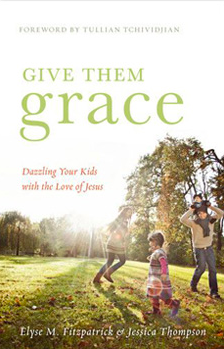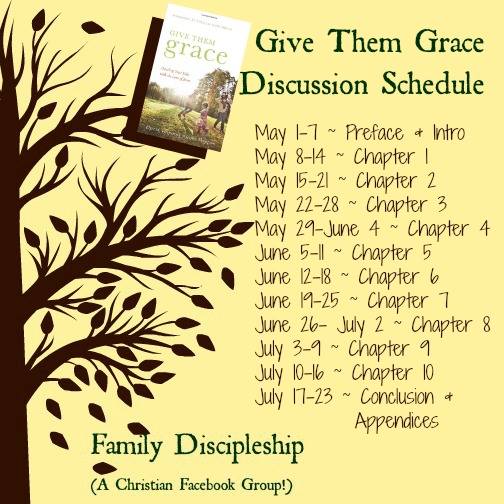This week, we're in Chapter 6 of the Give Them Grace book club. To join us, all you need is a copy of Give Them Grace. After that, read these posts:
Join us in the Family Discipleship Facebook Group for more discussion throughout the week!
Wisdom in Proverbs
When we think of raising our children, and instilling wisdom into their lives, often we think of the book of Proverbs. With 31 chapters equaling 31 days of most months, there is much that we can learn and apply to not only the lives of our children but our lives as well. In chapter 6 of Give Them Grace, we start out with a walk down the Emmaus road, right after the resurrection of Christ. The writers then remind us that Jesus Christ and His gospel of grace can be found on every page of scripture – including the book of Proverbs.
The book of Proverbs is filled with different characters and if we watch for Christ, we find him in the Wise Son that is talked about throughout the book. Yet, Jesus also took the punishment for each and every one of us that is often talked about in Scripture. I loved how the author reminded us that “even in times of correction we'll whisper His name to them through our tears and theirs.”
Solomon was not able to produce wise children and he was the wisest man on earth. He himself struggled to raise wise children. Many who parent feel like if they follow the “clear-cut wisdom in proverbs” their kids will turn out just right. But they do it without the presence of Christ – a real relationship with Him, and a true understanding of His grace – meeting them.
To Spank or Not to Spank
Many people question if they should spank their children or not. Scripture gives four verses that talk about physical discipline and this chapter also suggests that this is a Biblical practice, and the sign of a loving relationship. However, it is all about the way we approach the spanking that changes the heart of the child.
We should talk to our children about the reason that they are getting spanked. It is more than just because of their disobedience, but because we as parents need to be in obedience to God. We should remind them of the physical punishment that Jesus received for us, that He did not deserve. We need to talk to our children about how this temporal discomfort is but for a moment, but the path that they are heading down will be one of constant pain by living a life in rebellion and disobedience to God.
The gospel can be a part of our discipline – even when the discipline is a spanking.
We need to be sure that before we spank, we are doing it for something they can actually obey. We should not spank our children for weakness or immaturity. The chapter reminds us that there is a difference between childishness and foolishness. We should be disciplining for foolishness – and not for them acting childish – because in most cases, the childish behavior is something that they are still working through. Childish behavior often requires us to teach the why behind obedience.
A 2-year-old, who is touching something they should not, needs to be given something else to play with. They need to have their hand moved and be told no. Doing these things is not going to teach them grace, but it is going to teach them to obey mom and dad's voice, which is very important. When we teach them to obey our voice we are also guiding them for later in life when they will need to hear and obey God's voice.
However, as the book suggests, the little one continues to disobey. And when he throws a fit when things don't go his way, a pop on the hand or bottom then becomes appropriate. Now we are teaching him to obey authority.
I have found, and this chapter also brings to light, teaching and disciplining our children in this way when they are young often means that they learn and understand at a younger age and physical discipline is not needed as maturity is gained. As the need for physical discipline decreases, an increase in gospel instruction will increase.
You may feel like you are in a season of giving spankings. I know that season well. However, we need to remember that fruit takes time to harvest. We need to pray that the Lord will bless our efforts to teach and train and discipline our children.
Teaching Forgiveness
“I forgive you.”
Often, parents teach children at a young age to say these words. However, this chapter suggests that we need to be careful having our children say these words. When we ask a child to say “I forgive you,” how often have they actually forgiven?
Think of a three-year-old who has had her toy taken away by her six-year-old brother. Mom comes in and makes all things right, and gives the little girl back the toy. She promps big brother to ask for forgiveness and little sister to say she forgives. But does she? Well, five minutes later, brother is now crying because sister has taken his toy. And, well, you guessed why. She is getting even. She hadn't forgiven – and now you have taught her to lie.
We need to be careful with the words we force our children to say. Instead, we need to use these moments to teach what forgiveness is, why it should be given, and that Christ has forgiven us.
Your Turn
After reading chapter 6 of Give Them Grace, what do you have to say about the gospel in discipline? Share your thoughts in the comments below and in the Family Discipleship Facebook Group.
.png)


